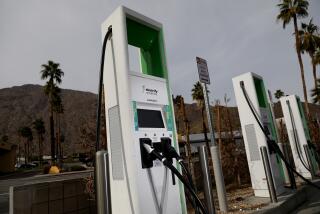Can condo owner insist on having an electric vehicle charging station?
Question: Our 15-unit condo complex, built in 1982, has only one parking space assigned to each unit. One owner purchased an electric car and requested board permission to install an electric vehicle charging station in her assigned parking spot, costing her $3,000. The electric plug she plans to use cuts into another homeowner’s exclusive-use garage parking spot. There’s a 24-hour electric vehicle charging station open to the public less than 0.1 mile from our building, but she wants to plug her car into the homeowners association’s electricity.
She wants our homeowners association to subsidize her personal charging station and its electric bill. Citing a website, she says she has that right and our association cannot refuse her request because new condo laws support green energy. She says SB 880 ensures her right to install a charging station in her personal parking space and requires homeowners associations to provide common-area space if it’s not practical to install in the unit owner’s own space. She says SB 1353 mandates that she be given access to common areas for installing a meter and electric lines; this means our meter box outside the garage’s ceiling. She threatens the board that “any voting that owners or the board do on this issue will be null and void since you can’t refuse me. It will be a waste of your time.”
We don’t want power cords everywhere, accidents or liability. What happens when she sells her unit? What if new owners don’t want a charging station in their only parking spot? Who pays for the electricity?
Answer: Owners who intimidate and threaten board directors with musings and recommendations from websites are reacting to global opinions that have not been vetted and that, more often than not, do not apply to their situations.
Although SB 880 provides for the installation of electric vehicle charging stations in common interest developments, the bill doesn’t strip the board of its authority to oversee the process of installation and maintenance.
SB 880 “would make those provisions applicable only to the installation or use of an electric vehicle charging (EVC) station in an owner’s designated parking space, as described.”
Under Civil Code section 1353.9(e), the application for approval shall be processed and approved by the association in the same manner as an application for approval of an architectural modification to the property, and “approval or denial of an application shall be in writing.” Section 1353.9(f)(3) requires the owner to maintain a homeowner liability policy of $1 million, with the association named as also insured under the policy.
If architectural rules require all modifications to common areas be returned to their original or natural state, then upon moving, this owner must comply at her own expense. Before any authorization, the board and unit owner should sign a contract explaining terms and conditions for installing, maintaining and removing the charging station.
If installed in the titleholder’s parking space or an exclusive-use common area, Civil Code section 1353.9(f)(2)(c) further requires the charging station user to pay for maintenance and repair of the station, as well as electricity use.
Under Civil Code sections 1353.9(h) and (i) the association may install a charging station in the common area for the use of all members of the association. It also may create a new parking space. But the association is not obligated to do either.
Under Civil Code section 1353.9(g), installation of a charging station for the exclusive use of an owner in a common area, that is not in an exclusive-use common area, shall be authorized by the association “only if installation in the owner’s designated parking space is impossible or unreasonably expensive....” “Impossible” means incapable of happening. That is not the situation with this owner’s parking space.
Even if it’s determined that the charging station cannot be installed in this owner’s existing exclusive-use space, Civil Code section 1353.9(g) requires the board to enter into a license agreement for use of a common area for charging where the owner is still required to carry insurance coverage for the space, wherever its located, pay for electricity used, and cover the cost of maintenance of the space and station.
Whether the charging station is to be placed in a common area or exclusive-use common area, the titleholder shall fully comply with Civil Code section 1353.9(f). If granting access to common areas creates a hazard to visitors and owners, it would be wise to consider other viable alternatives.
Zachary Levine, partner at Wolk & Levine, a business and intellectual property law firm, co-wrote this column. Vanitzian is an arbitrator and mediator. Send questions to Donie Vanitzian JD, P.O. Box 10490, Marina del Rey, CA 90295 or noexit@mindspring.com.






